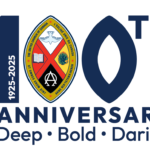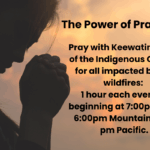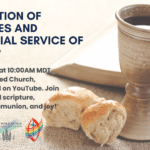(Please also see Regional chair Rev Helen Reed’s letter.)
Remit 1: Establishing an Autonomous National Indigenous Organization has passed. All 16 Regional Councils, the National Indigenous Council, and just over 80% of pastoral charges in The United Church of Canada voted in the recent remit process.
Here are the results of the remit vote:
- The National Indigenous Council, and the 16 voting regional councils: Yes: 17 No: 0
- Pastoral charges: Voted Yes: 1482 Voted No: 93.
In addition to the above numbers, the 20% of pastoral charges who did not vote also had their non-vote registered as a “no”, as per the terms of this category of remit.
Additional information about the remit vote results, as well as the response to the results from the National Indigenous Council, are posted on the General Council 44 website.
Thank you to all who voted, and to all who facilitated and participated in courageous and honest conversations and decisions on this significant question.
Gratitude to Indigenous church members
The Regional Council deeply thanks all the members of the Indigenous church who, over the past year, sat in learning spaces and meetings with us; we thank all those who both explained details and shared stories with us, to help us all understand the intent and hopes of this remit. We honour the generous sharing of your time, your presence, your stories, your reminders of the truths of history, and your honesty.
Next steps
The Indigenous United Church will work out next steps. In the meantime, the members of the non-Indigenous church can continue our work. As the General Council has noted, “Throughout this process, it became particularly clear that there is a need for deeper and ongoing work to address the issues of systemic racism which persist in the church, despite our continued commitment to reconciliation.”
This reality is important to absorb in our Regional and local contexts. Reflecting on what we learned during the year-long remit process will be one important commitment. Where did we struggle? What do we still need to learn and discuss? Where were there moments of deeper conversations and learning, and how do we keep expanding on those? The Regional Council will plan space for these conversations.
We who are part of the majority non-Indigenous church remain in relationship and ministry with Indigenous United Church members and their communities, as the body of Jesus. We carry the responsibilities of the Apologies and commitments of our ancestors in faith. We also carry commitments made by the whole country to change that shared relationship from one shaped by domination, land theft, and colonization to one of justice, sharing, mutual respect, and love. May God help and guide us on this journey.





